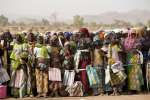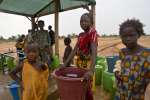- Text size
 |
|  |
|  |
| 
- Français
UNHCR chief warns at annual ExCom meet of risks to humanitarian action
News Stories, 28 September 2009
GENEVA, September 28 (UNHCR) – UN High Commissioner for Refugees António Guterres opened the annual meeting of UNHCR's government body on Monday with a warning that as global conflicts become more complex – involving state armies, militias and insurgents – humanitarian efforts are increasingly put at risk.
Recounting the deadly toll inflicted on UNHCR in Pakistan earlier this year, where over a six-month period three staff members were killed and one kidnapped and subsequently released, Guterres said the targeting of humanitarian workers "undermines not only the operations in question, but the very foundations of humanitarian action."
Opening the 60th session of UNHCR's governing Executive Committee (ExCom) in Geneva, Guterres said that providing humanitarian relief in an environment where the line separating the civilian from the military has become blurred is both "difficult and dangerous."
While the shrinking humanitarian space represents one of the greatest challenges the UN refugee agency faces, said Guterres, actions taken by some countries to limit access to their territories by asylum-seekers was effectively shrinking the "asylum space" in the developed world.
Guterres said practices by some countries to deny access to asylum procedures were not in keeping with international law, while other states had such low recognition rates for asylum-seekers as to render that access "meaningless."
These practices add to the problem of secondary movements, as asylum-seekers "search out states where they have some hope of having their protection needs recognized," said Guterres. "A truly European asylum space in this context is a must," he said.
The High Commissioner also updated delegates on the continuing reform process within UNHCR which, he said, is aimed at "finding the resources to protect more people, rescue more lives and bring home more refugees in safety and dignity."
Staffing at the agency's Geneva headquarters has been reduced by 30 percent, while global activities have increased by more than 50 per cent, he said. Work carried out by UNHCR's Global Service Centre in Budapest, Hungary would result in savings of US$13 million in rent and salaries in 2010 as compared to what it would have cost in Geneva.
Guterres also highlighted five global trends, which in combination with the world economic downturn, are causing crises to multiply and deepen. Population growth, urbanization, global warming, food, water and energy insecurity and migration are all more and more interconnected, he said.
Describing "an arc of crisis" stretching from south-west Asia to the Great Lakes of Africa, Guterres said two thirds of the world's refugees and three quarters of the 14.5 million internally displaced people assisted by UNHCR in 2008 resided in the area. In addition, nearly all significant internal displacement in 2009 had occurred there, notably in Pakistan, Somalia and the Democratic Republic of the Congo (DRC).
While some 600,000 refugees voluntarily repatriated last year, this represented a 17 percent decrease over the previous year and was the second lowest return figure in the past 15 years. "Massive repatriation movements are decelerating as the situations in Afghanistan, southern Sudan, DRC and elsewhere are less and less conducive to return and reintegration," Guterres told delegates.
With opportunities for repatriation and local integration declining, the demand for resettlement places is on the increase. Last year, UNHCR submitted more than 121,000 refugees for resettlement, twice as many as were put forward in 2006. "While this represents just over 1 percent of the total number of refugees in the world," said Guterres, "it is already a larger number of refugees than there are places available." The importance of resettlement as a durable solution will only increase, he said.
Joining Guterres at the opening of ExCom was UN High Commissioner for Human Rights Navanethem Pillay. The opening session also welcomed Djibouti and Moldova as new ExCom members. The week-long annual meeting reviews and approves UNHCR's programmes and budget, advises on protection issues and discusses a wide range of other topics.





































